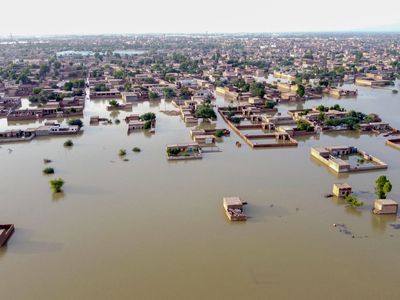
Moon Desk: India alerted Pakistan about an impending flood despite keeping the 1960 Indus Waters Treaty (IWT) in abeyance – a move Islamabad on Monday said should have been routed through treaty obligations instead of diplomatic channels. India shared the flood data on Sunday morning through its High Commission in Islamabad, according to officials here on Monday. The information was conveyed through a letter from the Indian High Commission in Islamabad.
“The High Commission of India to Pakistan presents its compliments to the Ministry of Foreign Affairs, Government of the Islamic Republic of Pakistan, Islamabad and has the honor to convey the following flood data. River and site Name: Tawi, Jammu. Date/Time: 24th August 2025, 10.00 Hrs, flood data: high flood,” said the letter. This was the first time India shared flood data with Pakistan since it unilaterally suspended the IWT following the Pahalgam attack in April. The Foreign Office confirmed the development later but questioned the Indian move of bypassing the IWT.
“On 24 August 2025, India communicated flood warnings through diplomatic channels, rather than through the Indus Waters Commission as required under the Indus Waters Treaty (IWT),” noted a Foreign Office readout. “India is obligated to fully comply with all provisions of the Treaty.”
The Foreign Office statement further said that India’s unilateral declaration to hold the IWT in abeyance constituted a serious violation of international law and could have significant negative consequences for peace and stability in South Asia. A Foreign Office official told that India seemed to have deliberately omitted reference to the IWT in order to set a new normal with Pakistan. India, according to the official, was trying to sidestep the provisions of the IWT.
An unnamed official in New Delhi told Reuter’s news agency that India shared the flood data with Pakistan on “humanitarian grounds” and not through the treaty obligations. The news agency further said that India’s external affairs ministry did not respond to its request for comment. Following the Indian alert, the Provincial Disaster Management Authority (PDMA) of Punjab issued a flood alert, warning that rising waters in the River Tawi were likely to affect levels in Gujarat and Sialkot via the Chenab River. The district administrations were asked to activate flood monitoring and early warning systems and ensure a coordinated response.
Signed in 1960 with the World Bank’s mediation, the IWT gives Pakistan rights to the western riversIndus, Jhelum, and Chenab for irrigation, drinking, and non-consumptive uses such as hydropower. India controls the eastern rivers including Ravi, Beas, and Sutlej but can also use the western rivers for limited power generation and irrigation, provided it does not alter their flow significantly. India put the IWT in “abeyance” in April after linking the deadly attack on tourists in Indian Illegally Occupied Jammu and Kashmir (IIOJK) to Pakistan. The tensions escalated in May to the worst military clash between the nuclear-armed rivals in decades.
However, the Permanent Court of Arbitration in its recent ruling concluded that India could not deny Pakistan its share of water and emphasised that run-of-the-river projects had to be strictly complied with treaty provisions. Earlier, the Hague based court also ruled that no country party to the IWT could unilaterally walk away from the water sharing accord or alter its provisions. Pakistan has repeatedly warned that any attempt by India to deny the country its due share of water would be considered as an act of war.





